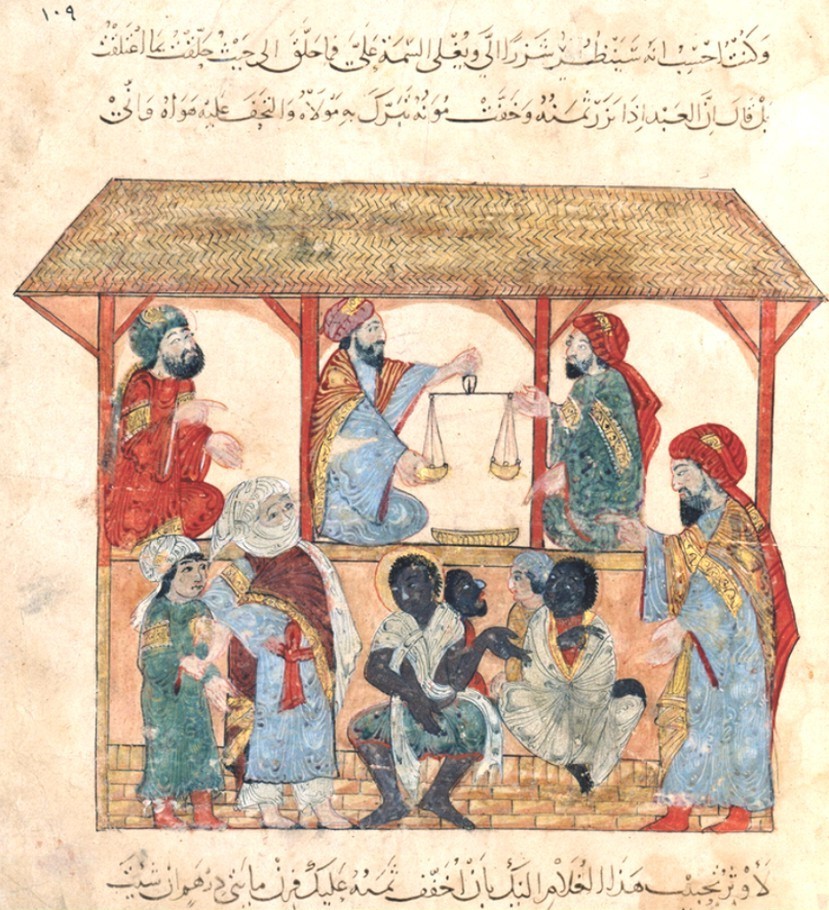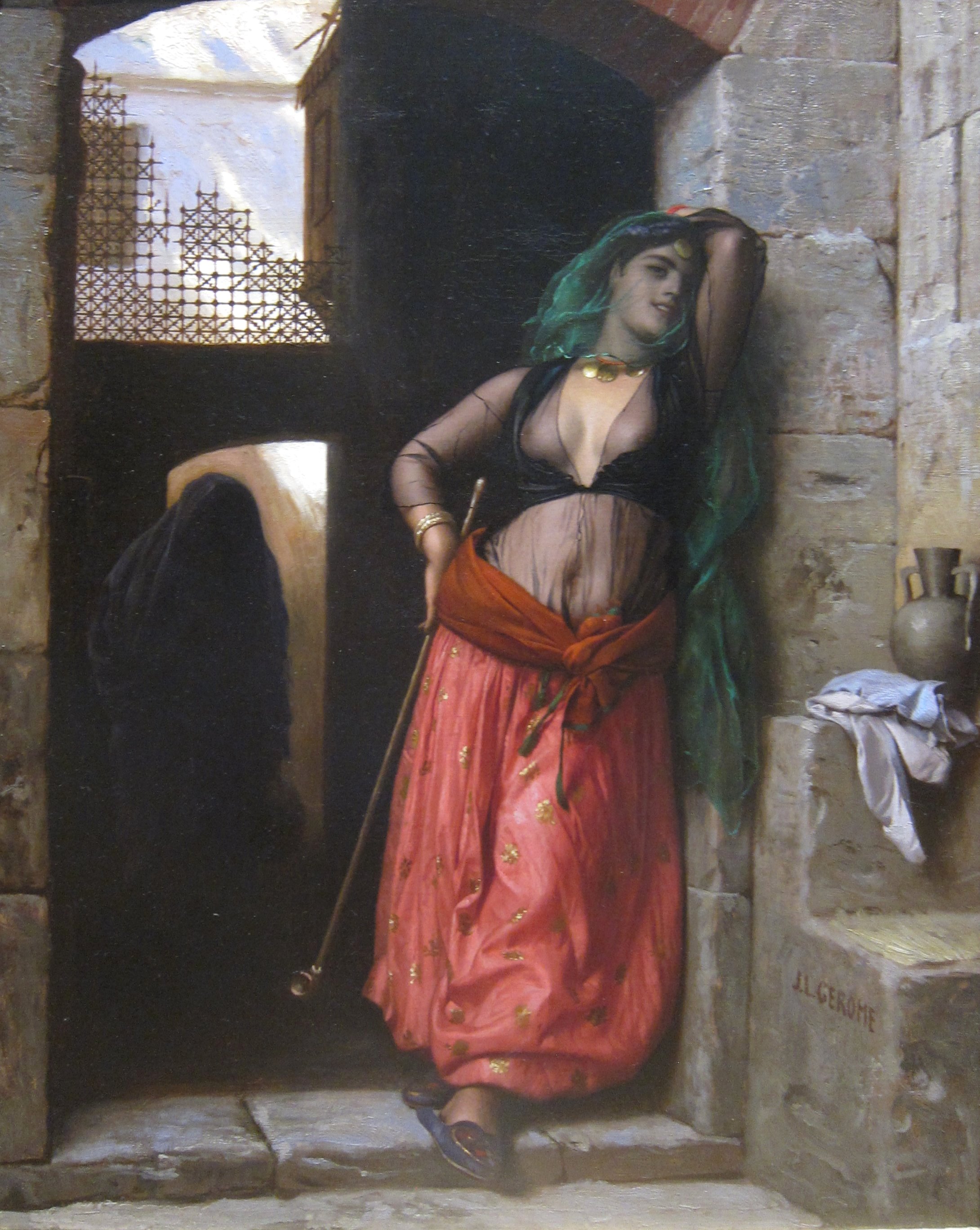|
Qayna
''Qiyān'' ( ar, قِيان, ; singular ''qayna'', ar, قَينة, ) were a social class of women, trained as entertainers, which existed in the pre-modern Islamic world. The term has been used for both non-free women and free, including some of which came from the nobility. It has been suggested that "the ''geisha'' of Japan are perhaps the most comparable form of socially institutionalized female companionship and entertainment for male patrons, although, of course, the differences are also myriad". Historically, the ''qiyān'' flourished under the Umayyad Caliphate, the Abbasid Caliphate, and in Al-Andalus. Terminology ''Qiyān'' is often rendered in English as 'singing girls' or 'singing slave girls', but these translations do not reflect the fact that ''qiyān'' might be of any age, and were skilled entertainers whose training extended well beyond singing, including for example dancing, composing music and verse, reciting historical or literary anecdotes (''akhbar''), cal ... [...More Info...] [...Related Items...] OR: [Wikipedia] [Google] [Baidu] |
Ulayya Bint Al-Mahdi
Ulayya bint al-Mahdi ( ar, عُلَيّة بنت المهدي, ʿUlayya bint al-Mahdī, 777–825) was an Abbasid princess, noted for her legacy as a poet and musician. Biography ‘Ulayya was one of the daughters of the third Abbasid Caliph al-Mahdi ( r. 775–85), who reigned from 775 to his death in 785, and was noted for promoting poetry and music in his realm. Her mother was a singer and concubine called Maknūna (herself the ''jāriya'' of one al-Marwānīya). Maknunah was a songstress. She was owned by Al-Marwaniyyah. Al-Mahdi, while yet a prince, bought her for 100,000 silver dirhams. She found such favor with the prince that Al-Khayzuran (Al-Mahdi's wife) used to say, "No other woman of his made my position so difficult." She gave birth to Al-Mahdi's daughter Ulayya. It appears that, with her father dying early in her life, ‘Ulayya was brought up by her half-brother Harun al-Rashid (r. 786–809). ‘Ulayya was a princess, and, like her half-brother Ibrahim ibn al-Mah ... [...More Info...] [...Related Items...] OR: [Wikipedia] [Google] [Baidu] |
History Of Slavery In The Muslim World
The history of slavery in the Muslim world began with institutions inherited from pre-Islamic Arabia;Lewis 1994Ch.1 and the practice of keeping slaves subsequently developed in radically different ways, depending on social-political factors such as the Arab slave trade. Any non-Muslim could be enslaved. Throughout Islamic history, slaves served in various social and economic roles, from powerful emirs to harshly treated manual laborers. Early on in Muslim history slaves provided plantation labor similar to that in the early-modern Americas, but this practice was abandoned after harsh treatment led to destructive slave revolts, the most notable being the Zanj Rebellion of 869–883. Slaves were widely employed in irrigation, mining, and animal husbandry, but most commonly as soldiers, guards, domestic workers, concubines (sex slaves). Many rulers relied on military slaves (often in huge standing armies) and on slaves in administration – to such a degree that the slaves could ... [...More Info...] [...Related Items...] OR: [Wikipedia] [Google] [Baidu] |
Almeh
Almah or Almeh ( arz, عالمة ' , plural ' , from Arabic: ' "to know, be learned") was the name of a class of courtesans or female entertainers in Egypt, women educated to sing and recite classical poetry and to discourse wittily, connected to the '' qayna'' slave singers. They were educated girls of good social standing, trained in dancing, singing and poetry, present at festivals and entertainments, and hired as mourners at funerals. The Awalim were first introduced as singers, not dancers-cum-prostitutes, according to Edward William Lane's book, ''Manner and Costumes of modern Egyptians''. Lane additionally wrote that the Almah didn't display herself at all, but sang from behind a screen or from another room at weddings and other respectable festivities. Consequently, the Awalem were not subject to exile in Upper Egypt Upper Egypt ( ar, صعيد مصر ', shortened to , , locally: ; ) is the southern portion of Egypt and is composed of the lands on both sides of ... [...More Info...] [...Related Items...] OR: [Wikipedia] [Google] [Baidu] |
Repartee
Wit is a form of intelligent humour, the ability to say or write things that are clever and usually funny. Someone witty is a person who is skilled at making clever and funny remarks. Forms of wit include the quip, repartee, and wisecrack. Forms As in the wit of Dorothy Parker's set, the Algonquin Round Table, witty remarks may be intentionally cruel (as in many epigrams), and perhaps more ingenious than funny. A quip is an observation or saying that has some wit but perhaps descends into sarcasm, or otherwise is short of a point, and a witticism also suggests the diminutive. Repartee is the wit of the quick answer and capping comment: the snappy comeback and neat retort. ( Wilde: "I wish I'd said that." Whistler: "You will, Oscar, you will.")Monty Python: Oscar Wilde sketch Metaphysical poetry as a style was prevalent in the time of English playwright William Shakespeare, who admonished pretension with the phrase "Better a witty fool than a foolish wit". It may combine wo ... [...More Info...] [...Related Items...] OR: [Wikipedia] [Google] [Baidu] |
Nisa Al-khulafa
Nisa may refer to: Locations * Nısa, a village in Azerbaijan * Nisa (Boeotia), a city of ancient Boeotia, Greece *Nisa (Lycia), an ancient city now in Turkey *Nisa (Megaris), a city of ancient Megaris, Greece *Nisa, Iran, a village in Hormozgan Province, Iran *Nisa, Portugal, a municipality in the district of Portalegre * Nisa, Turkmenistan, an ancient city, first capital of the Parthians * Nisa River (other), several rivers Organizations *National Intelligence and Security Agency, of the Federal Republic of Somalia *National Intelligence Security Authority, a defunct agency of the Republic of the Philippines * Nippon Ichi Software, a Japanese video game developer *Nisa (retailer), a British symbol group of small grocery stores *Nisa Aşgabat, a Turkmen football club *Nuclear and Industrial Safety Agency, a defunct agency of the Government of Japan Sports *National Ice Skating Association, a British sports governing body *National Independent Soccer Association, an Amer ... [...More Info...] [...Related Items...] OR: [Wikipedia] [Google] [Baidu] |
Al-Suyuti
Jalal al-Din al-Suyuti ( ar, جلال الدين السيوطي, Jalāl al-Dīn al-Suyūṭī) ( 1445–1505 CE),; (Brill 2nd) or Al-Suyuti, was an Arab Egyptian polymath, Islamic scholar, historian, Sufi, and jurist. From a family of Persian origin, he was described as one of the most prolific writers of the Middle Ages. His biographical dictionary ''Bughyat al-Wuʻāh fī Ṭabaqāt al-Lughawīyīn wa-al-Nuḥāh'' contains valuable accounts of prominent figures in the early development of Arabic philology. He was appointed to a chair in the mosque of Baybars in Cairo in 1486, and was an authority of the Shafi'i school of thought (''madhhab''). Biography Al-Suyuti was born on 3 October 1445 AD (1 Rajab 849 AH) in Cairo, Egypt. He hailed from a Persian family on his paternal side. His mother was Circassian. According to al-Suyuti his ancestors came from al-Khudayriyya in Baghdad. His family moved to Asyut in Mamluk Egypt, hence the ''nisba'' "Al-Suyuti". His father taught Sha ... [...More Info...] [...Related Items...] OR: [Wikipedia] [Google] [Baidu] |
Islamic
Islam (; ar, ۘالِإسلَام, , ) is an Abrahamic monotheistic religion centred primarily around the Quran, a religious text considered by Muslims to be the direct word of God (or ''Allah'') as it was revealed to Muhammad, the main and final Islamic prophet.Peters, F. E. 2009. "Allāh." In , edited by J. L. Esposito. Oxford: Oxford University Press. . (See alsoquick reference) " e Muslims' understanding of Allāh is based...on the Qurʿān's public witness. Allāh is Unique, the Creator, Sovereign, and Judge of mankind. It is Allāh who directs the universe through his direct action on nature and who has guided human history through his prophets, Abraham, with whom he made his covenant, Moses/Moosa, Jesus/Eesa, and Muḥammad, through all of whom he founded his chosen communities, the 'Peoples of the Book.'" It is the world's second-largest religion behind Christianity, with its followers ranging between 1-1.8 billion globally, or around a quarter of the world's popu ... [...More Info...] [...Related Items...] OR: [Wikipedia] [Google] [Baidu] |
Basra
Basra ( ar, ٱلْبَصْرَة, al-Baṣrah) is an Iraqi city located on the Shatt al-Arab. It had an estimated population of 1.4 million in 2018. Basra is also Iraq's main port, although it does not have deep water access, which is handled at the port of Umm Qasr. However, there is ongoing constuction of Grand Faw Port on the coast of Basra, which is considered a national project for Iraq and will become one of the largest ports in the world and the largest in the Middle East, in addition, the port will strengthen Iraq’s geopolitical position in the region and the world. Furthermore, Iraq is planning to establish large naval base in the Faw peninsula. Historically, the city is one of the ports from which the fictional Sinbad the Sailor journeyed. The city was built in 636 and has played an important role in Islamic Golden Age. Basra is consistently one of the hottest cities in Iraq, with summer temperatures regularly exceeding . In April 2017, the Iraqi Parli ... [...More Info...] [...Related Items...] OR: [Wikipedia] [Google] [Baidu] |
Ta’if
Taif ( ar, , translit=aṭ-Ṭāʾif, lit=The circulated or encircled, ) is a city and governorate in the Makkan Region of Saudi Arabia. Located at an elevation of in the slopes of the Hijaz Mountains, which themselves are part of the Sarat Mountains, the city has a 2020 estimated population of 688,693 people, making it the 6th most populous city in the kingdom. There is a belief that Taif is indirectly referred to in Quran 43:31. The city was visited by the Islamic prophet Muhammad, sometime in the early 7th century, and was inhabited by the tribe of Banu Thaqif. It is still inhabited to this day by their descendants. As a part of the Hejaz, the city has seen many transfers-of-power throughout its history, with the last being during the Saudi conquest of Hejaz in 1925. The city has been called the unofficial summer capital of Saudi Arabia and has also been called the best summer destination in Saudi Arabia as it enjoys a moderate weather during summer, unlike most of the A ... [...More Info...] [...Related Items...] OR: [Wikipedia] [Google] [Baidu] |



.jpg)
